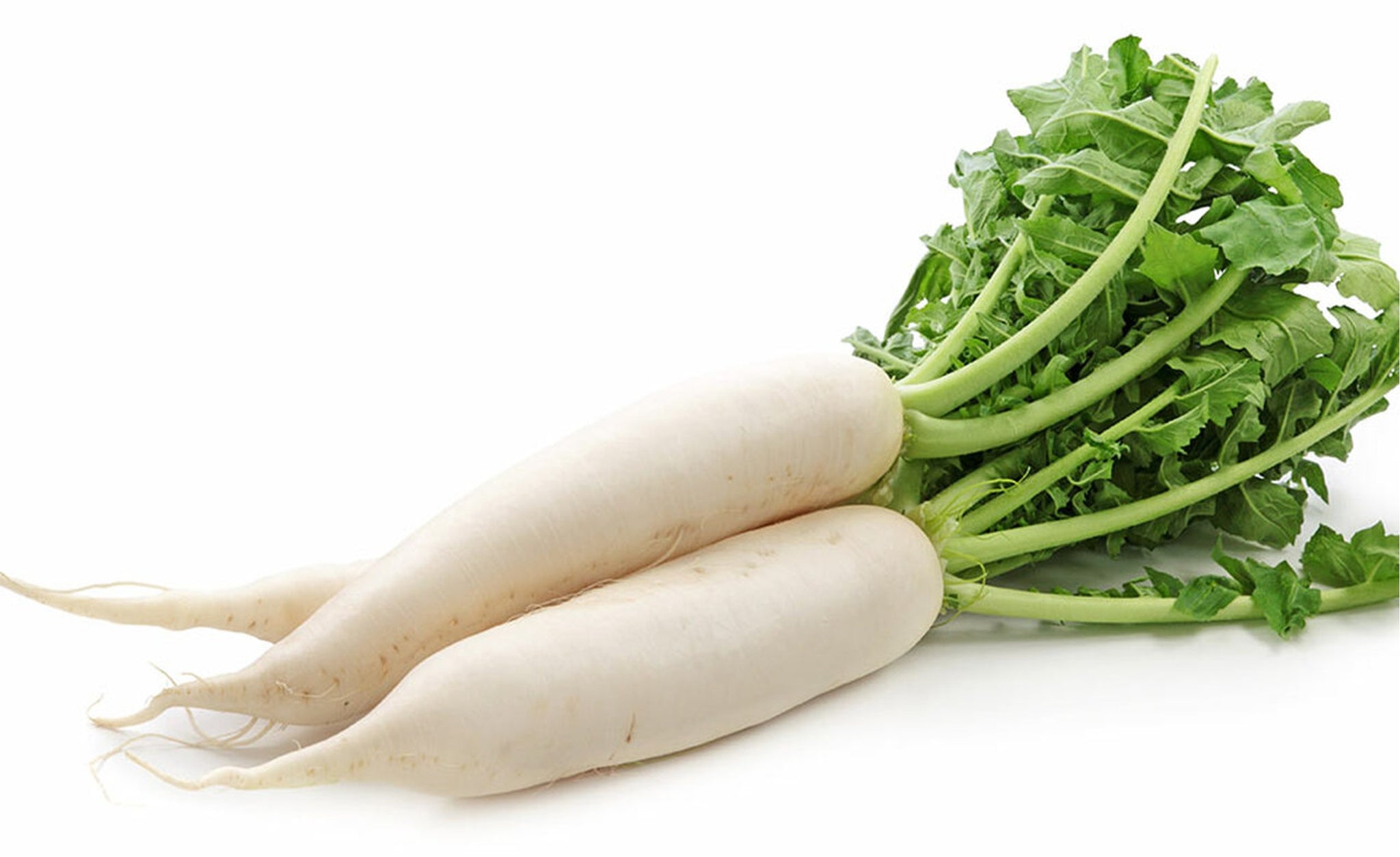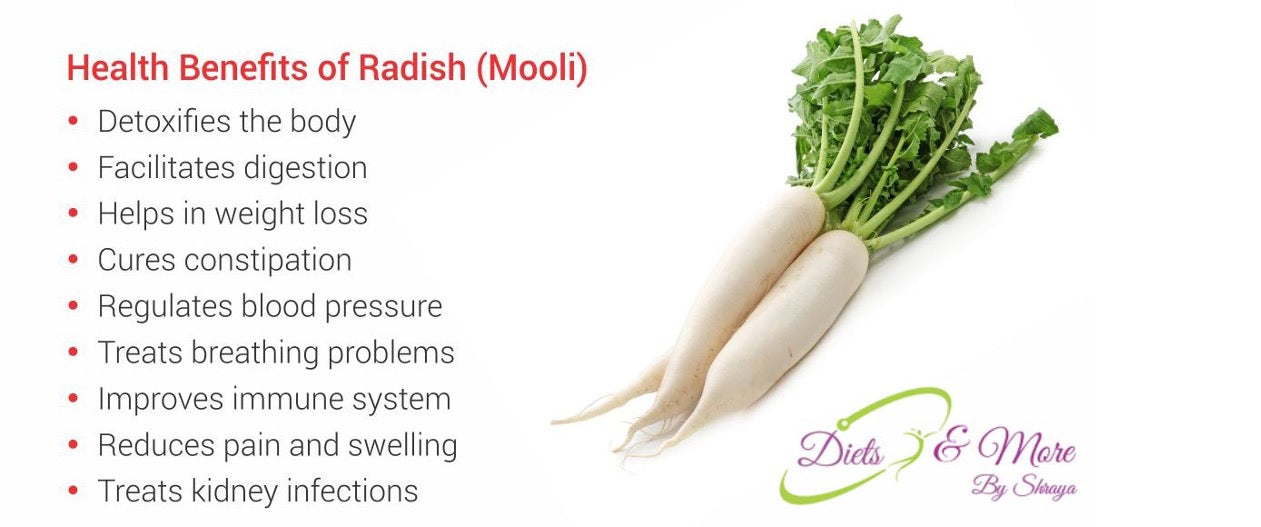Mooli
- Product Weight: 454 g
- Category: Fresh Fruits & Vegetables, Grocery & Gourmet Foods, Out of Stock, Vegetables
The spicy, peppery radish (Raphanus sativus) is a root vegetable, but is less starchy than many other root veggies, like potatoes and parsnips. It is part of the cruciferous vegetable family, related to turnips, cabbage, and broccoli. The radish seems to have been one of the first European crops introduced to the Americas. You can enjoy its zingy crunch raw on a salad, or cook as you would a potato for milder flavor. Radishes are low in calories, provide some fiber and are a good source of vitamin C.
Radish Nutrition Facts
The following nutrition facts are provided by the USDA for 1 cup (116g) sliced, raw radish.
- Calories: 19
- Fat: 0.1g
- Sodium: 45mg
- Carbohydrates: 3.9g
- Fiber: 1.9g
- Sugar: 2.2g
- Protein: 0.8g
Carbs
Radishes lack starch, which is an easily digestible form of carbohydrate that quickly breaks down into simple sugars. The carbs in radishes are half simple sugars (glucose and fructose) and half fiber.
The glycemic index of a food is an indicator of how much and how fast a food raises your blood sugar. As with most non-starchy vegetables, there is no scientific study of the glycemic index of radishes (but it is presumed to be low).
Fat
Radishes have just a tiny trace of fat.
Protein
Like most vegetables, radishes are not high in protein, although there is just under 1 gram in a cup of raw radish slices.
Vitamins and Minerals
Radishes are an good source of vitamin C with 17 milligrams per 1-cup serving. This amount is 23% of the recommended daily allowance (RDA) for women and 19% of the RDA for men and 19% of the daily value set by the FDA for food labels. Since the body can't produce its own vitamin C, consuming it in the diet (or via supplements) is essential.
Radishes also contain smaller amounts of folate and vitamin B6 and the minerals potassium, manganese, and calcium.
Health Benefits of Radishes
Radishes have some healthful properties thanks to their fiber, vitamin C, and antioxidant content. For example, vitamin C is important in many physiological processes, including protein metabolism, wound healing, and immune system regulation.
May Lower Blood Sugar
Researchers have suggested that consuming radishes may be beneficial for people with diabetes because it slows sugar absorption and reduces the starch-induced post-meal glycemic load.
Provides Antioxidants
The antioxidant compounds in radishes may provide some of their anti-diabetic power. Anthocyanins help give radishes their bright range of colors, and research suggests that consuming more of them is associated with a lower risk of cardiovascular disease.
In general, antioxidants are beneficial because they can help repair oxidative stress caused by free radicals in the body. This stress can contribute to inflammation, obesity, diabetes, and other conditions.
Reduces Risk of Chronic Disease
Like antioxidants, dietary fiber has many health benefits that have been identified by scientists. These include preventing and managing heart disease, high cholesterol, diabetes, and digestive diseases. Researchers are also looking at fiber's ability to prevent infection and even improve mood and memory.
May Reduce Risk of Cancer
Radishes may not seem to have much in common with broccoli, but both are cruciferous vegetables. Research has shown some associations between a diet high in these nutritious veggies and a lowered risk of cancer.7 Specific to radishes, a study of radish extract found that it could inhibit the proliferation of certain cancer cells in a lab setting.
Prevents Gallstones
Like other cruciferous vegetables, radishes contain a compound called glucosinolate. It has antioxidant and anticancer properties and can decrease cholesterol levels in the liver. This, in turn, can prevent the formation of gallstones.
Low in FODMAPs
A diet low in certain carbohydrates called FODMAPs (fermentable oligo-, di-, mono-saccharides and polyols) may help ease symptoms in people with bowel diseases such as irritable bowel syndrome and Crohn's disease. Radishes are suitable for people following a low-FODMAP diet.
The spicy, peppery radish (Raphanus sativus) is a root vegetable, but is less starchy than many other root veggies, like potatoes and parsnips. It is part of the cruciferous vegetable family, related to turnips, cabbage, and broccoli. The radish seems to have been one of the first European crops introduced to the Americas. You can enjoy its zingy crunch raw on a salad, or cook as you would a potato for milder flavor. Radishes are low in calories, provide some fiber and are a good source of vitamin C.
Radish Nutrition Facts
The following nutrition facts are provided by the USDA for 1 cup (116g) sliced, raw radish.
- Calories: 19
- Fat: 0.1g
- Sodium: 45mg
- Carbohydrates: 3.9g
- Fiber: 1.9g
- Sugar: 2.2g
- Protein: 0.8g
Carbs
Radishes lack starch, which is an easily digestible form of carbohydrate that quickly breaks down into simple sugars. The carbs in radishes are half simple sugars (glucose and fructose) and half fiber.
The glycemic index of a food is an indicator of how much and how fast a food raises your blood sugar. As with most non-starchy vegetables, there is no scientific study of the glycemic index of radishes (but it is presumed to be low).
Fat
Radishes have just a tiny trace of fat.
Protein
Like most vegetables, radishes are not high in protein, although there is just under 1 gram in a cup of raw radish slices.
Vitamins and Minerals
Radishes are an good source of vitamin C with 17 milligrams per 1-cup serving. This amount is 23% of the recommended daily allowance (RDA) for women and 19% of the RDA for men and 19% of the daily value set by the FDA for food labels. Since the body can't produce its own vitamin C, consuming it in the diet (or via supplements) is essential.
Radishes also contain smaller amounts of folate and vitamin B6 and the minerals potassium, manganese, and calcium.
Health Benefits of Radishes
Radishes have some healthful properties thanks to their fiber, vitamin C, and antioxidant content. For example, vitamin C is important in many physiological processes, including protein metabolism, wound healing, and immune system regulation.
May Lower Blood Sugar
Researchers have suggested that consuming radishes may be beneficial for people with diabetes because it slows sugar absorption and reduces the starch-induced post-meal glycemic load.
Provides Antioxidants
The antioxidant compounds in radishes may provide some of their anti-diabetic power. Anthocyanins help give radishes their bright range of colors, and research suggests that consuming more of them is associated with a lower risk of cardiovascular disease.
In general, antioxidants are beneficial because they can help repair oxidative stress caused by free radicals in the body. This stress can contribute to inflammation, obesity, diabetes, and other conditions.
Reduces Risk of Chronic Disease
Like antioxidants, dietary fiber has many health benefits that have been identified by scientists. These include preventing and managing heart disease, high cholesterol, diabetes, and digestive diseases. Researchers are also looking at fiber's ability to prevent infection and even improve mood and memory.
May Reduce Risk of Cancer
Radishes may not seem to have much in common with broccoli, but both are cruciferous vegetables. Research has shown some associations between a diet high in these nutritious veggies and a lowered risk of cancer.7 Specific to radishes, a study of radish extract found that it could inhibit the proliferation of certain cancer cells in a lab setting.
Prevents Gallstones
Like other cruciferous vegetables, radishes contain a compound called glucosinolate. It has antioxidant and anticancer properties and can decrease cholesterol levels in the liver. This, in turn, can prevent the formation of gallstones.
Low in FODMAPs
A diet low in certain carbohydrates called FODMAPs (fermentable oligo-, di-, mono-saccharides and polyols) may help ease symptoms in people with bowel diseases such as irritable bowel syndrome and Crohn's disease. Radishes are suitable for people following a low-FODMAP diet.


































